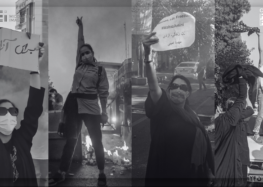National Virtual Private Networks (VPNs)
One of the principal ways that Iranians have been able to maintain access to the global Internet has been through the use of Virtual Private Networks (VPNs), which allow users to circumvent government filters by providing encrypted links to networks based abroad, effectively enabling a computer to function as if it is based in another country. The computer is thus able to directly connect to the global Internet. As a result, the authorities have increasingly moved to target this access, by shutting down VPN ports and simultaneously offering and encouraging the use of “legal VPNs” that are provided by a government organization (the Telecommunication Infrastructure Company, affiliated to the Telecommunications Ministry).
Government shut downs of VPNs have tended to come in waves. For example, VPNs were shut down during the 2009 post-presidential election crackdown, again in October 2011 by the state filtering Working Group because they were “allowing access to criminal content,” and again in May 2013. Yet users have usually been able to eventually reestablish VPN ports, sometimes, in fact, quite quickly. The government thus sought a more effective way of countering these (non-government) VPNs.
Its answer was national (or “legal”) VPNs, provided by the government. National VPNs were first mentioned by the head of the Passive Defense Organization, which is under the Ministry of the Interior, in October of 2012. On January 27, 2013, Mehdi Akhavan Behabadi, the director of the Supreme Cyberspace Council, announced the establishment of the legal VPNs in an interview with the Mehr news agency, and on February 19, 2013, the national VPN service was launched. The national VPNs are issued to individuals through the website www.vpn.ir, a portal that cannot be accessed from abroad.
Similar to the government’s national email service, however, its VPN initiative has met with little success; there has been scant interest in using government-issued VPNs where filtered sites remain filtered, since the purpose of using VPNs is to access filtered sites. Indeed, after the election of President Rouhani in June 2013, Mahmoud Khosravi, the head of the Telecommunications Infrastructure Company said the national VPN project had in fact failed. He added that despite all efforts to inform the public and the expenditure of millions of dollars, only 26 companies had registered for national VPNs.
Nevertheless, hardliners in the government have not ceased their attempts to counter the use of (non- government-issued) VPNs. On May 12, 2014, the FATA cyber police force declared that VPNs were allowing criminal activity and the Judiciary Commission of the Majlis (the Iranian Parliament) began discussion of a bill to punish those who use it. If made into law, it could significantly reduce the number of VPN users — and with it, access to the global Internet for Iranians.
In sum, progress on the development and implementation of Iran’s National Internet and all its various components has been made—even if unevenly and behind schedule—and it is continuing. Reza Bagheri- Asl, the acting deputy head of the government’s Information Technology Organization, announced on April 21, 2014, that the National Internet had become fully operational for government offices. He specifically cited the cooperation of the Telecommunications Ministry, the Information Technology Organization, and the Telecommunication Infrastructure Company, as well as telecommunication operators. Independent analysts have questioned whether implementation has actually been fully achieved, but the statement indicates progress is underway.






